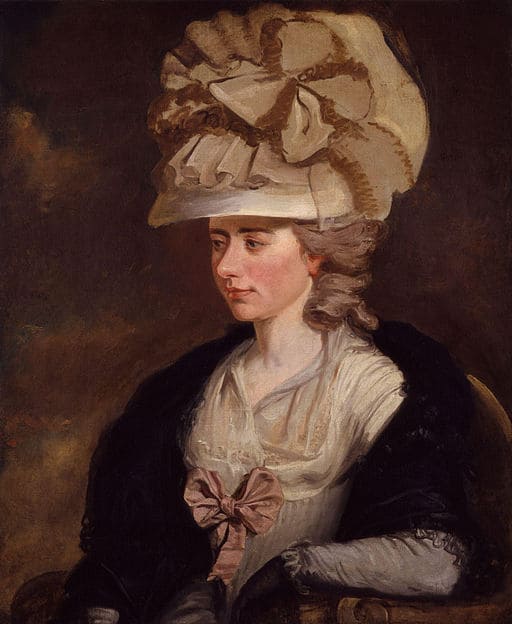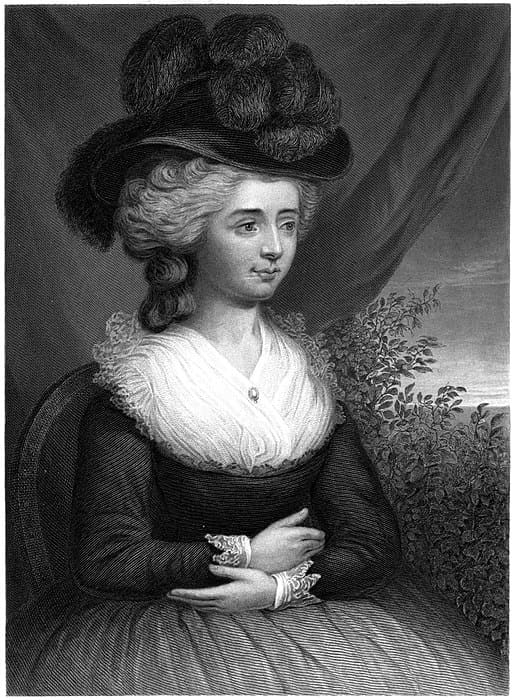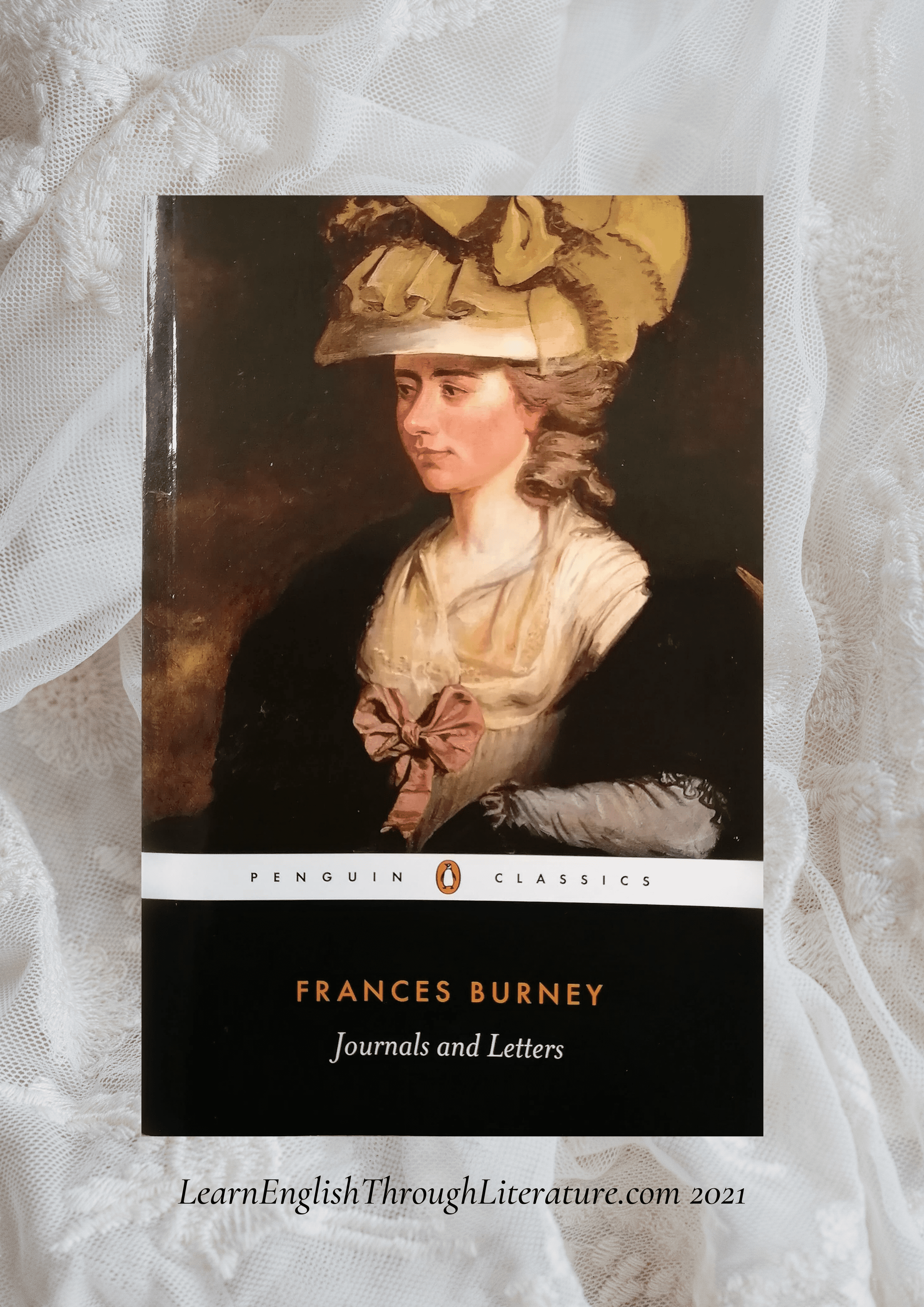As someone who has been studying French for years and still make mistakes, I have become more aware of the kinds of pitfalls that native French speakers often experience while studying English. You might say I have a kind of ‘sympathy’ for their mistakes since those are often areas that native English speakers like me make mistakes with too!
I thought it might be helpful therefore to prepare a Lesson that outlines some of the most common mistakes that French speakers make (and students from other nationalities also make some of these mistakes). ✨ It is definitely not a judgement or criticism! On the contrary I want to support you and help you overcome areas that might be particularly challenging, so that you reach your full potential sooner.
So this Lesson will cover 21 points (eleven in the first part of the Lesson, and ten in the second) with reference to a British author of French descent, Frances (Fanny) Burney (1752-1840).

Public Domain via Wikipedia Commons
📚FRANCES BURNEY – A BACKGROUND
Fanny Burney is one writer who has been an inspiration to me in this area of language learning and literature. She was a British author who spent many years of her life living in France after the revolution there. However, before she ever wrote her first book, she is said to have struggled greatly with learning to read and write, probably due to a learning disability such as dyslexia. At the age of eight, she still couldn’t read the alphabet. Around this time, her father sent both her sisters (who were considered to be more intelligent and attractive) to a school in France for a good education; however, Frances (or Fanny, as she was known familiarly) was kept back as no one expected her to be able to overcome her reading difficulties.
She worked hard on her own and forced herself to study all the books her father owned in his library. Scholars who have studied her early writings can see evidence of her hard work as she tried her best to read and write clearly for many years. Gradually, she began writing short stories of her own, and by the time she was in her mid-twenties she had quietly published her first novel even before her father knew about it. Imagine his surprise on finding out that this bestseller novel was written by his own daughter! That novel was Evelina (1778), which I reference below. (I wrote a Lesson on this novel about a year ago which you can read here.)

Another influence on her life was their family friend, a playwright called Samuel Crisp, whom Fanny affectionately called her ‘Daddy Crisp’. He encouraged her from a young age to write letters and journals describing anything that happened to her, many of which she shared with him. In fact, her novels were written in epistolary form, that is, as if they were a collection of letters describing events that happen to the characters. Burney would continue to write journals and letters to her family for the rest of her life, some of which I have quoted from below. (All my quotations from her letters or journals are taken from Frances Burney: Journals and Letters, as edited by Peter Sabor and Lars E. Troide (Penguin Classics, London: 2001)).
Being of French descent herself and later marrying a French man and settling down near Paris, Fanny Burney was highly aware of the challenges and beauties of learning a new language and cultural way of thinking. That is why her writings are perfect for explaining some of the linguistic mistakes we are covering today.
Burney’s novels and other writings are proof that, with hard work and proper attention to detail, it is possible to become a great communicator and storyteller. Virginia Woolf, a well-known 20th century British novelist, eventually called Burney ‘the Mother of English Fiction’, and another writer, Anna Letitia Barbauld wrote of her that ‘Scarcely any name, if any, stands higher in the list of novel-writers than that of Miss Burney.’

…
📝 #1 THE VERB ‘TO AGREE’
When a person wants to express agreement with someone in French, they use the verb ‘être’ (to be) with ‘d’accord avec …’ meaning ‘in agreement with’ or ‘of the same accord with’.
In English, we just use the verb ‘to agree’ (without ‘am/is/are’). So instead of writing or saying, ‘I am agree with you’ (a mistake ❗), we completely leave out the form of the verb ‘to be’:
✒️ I agree with you, They agreed with us, etc.
You can correctly write / say ‘I am in agreement with you’ where ‘agreement’ is a noun and requires the verb ‘to be’. However, this sounds more formal and most English speakers prefer simply to conjugate ‘to agree’.
📙 ‘She was charmed to find your opinion agreed with her own …’
– Frances Burney, Evelina (emphasis mine)
📜 “I must not, now, drop a word of how much the same sejour would have agreed with me …”
– Frances Burney, from ‘Journal Letter to Dr Burney, 13 August 1791′
…
📝 #2 USING ‘I’ INSTEAD OF ‘WE ARE’
When I talk about how I went somewhere with a group of people, as an English speaker it is customary to say, ‘I went with Jane and Emily’. On the other hand, in French the tendency is to say ‘nous sommes alleés avec Jane et Emily’ / ‘we went with Jane and Emily’ – thus including the speaker in the ‘we’ from the start.
Remember: these distinctions between a) the speaker (or another person, as in our quotation below) and b) the other people in a group are emphasised in English through the use of personal pronouns, even though they disappear in French.
📜 “He was so officious, that he would not be prevailed upon to return home, till he had walked with us to Mr. Dawkins’s.”
– Frances Burney, Evelina (emphasis mine)
📜 “Dr Johnson tutored Miss Thrale while I was with you …”
– Frances Burney, from ‘Letter to Susanna Burney, 21-27 May 1779‘ (emphasis mine)
…
📝 #3 ‘SINCE’ AND ‘FOR’
In French, when someone wants to say they have been doing something for some time, they use the word ‘depuis’.
✍️ This translates as ‘since’ in English, but we also use the word ‘for’ to express the duration of some action or state of being.
What is more, they are used differently and are not interchangeable.
‘Since’ describes something that has been happening from a stated date or season as far as the present moment. ✍️ It emphasises a process with a clear starting point. So you can say,
✒️ I have been studying English since 2019.
Here is one example from Frances Burney’s own letters:
📜 “I must now … give you a narration of my peculiar situation, and never ending difficulties, since last October, when – I am pained to recollect, I last wrote to you.”
– Frances Burney, from ‘Letter to Georgiana Waddington 27 July 1802‘ (emphasis mine)
On the other hand, ‘for’ is emphasises the duration of time, without specifying the start date. For this reason, ‘for’ is used with words like ‘days’, ‘months’, ‘years’, etc.
✒️ I have been studying English for two years.
In this sentence, describing a period in her life when she was very ill, Fanny Burney uses ‘for’ to describe a period of time:
📜 “M. Dubois [a doctor] gave me a prescription to be pursued for a month …”
– Frances Burney, from ‘Letter to Esther Burney, 22 March – June 1812′ (emphasis mine)
…
📝 #4 USING ‘IT’ (AND WITHOUT SPECIFYING A GENDER)
When we talk about an inanimate thing (something that isn’t alive), we use ‘it’ rather than ‘he’ or ‘she’. Sometimes we even use ‘it’ to describe an animal (unless it is a family pet).
On the other hand, because nouns in French all have a gender, it is common to use a gendered pronoun to describe them: ‘J’ai une jupe, elle est noire.’
In English, this would be translated as ‘I have a skirt, it is black.’
📜 “Bath is extremely altered since I last visited it. Its circumference is perhaps trebled: but its buildings are so unfinished, so spread, so every where beginning, and no where ending, that it looks rather like a space of Ground lately fixed upon for creating a Town, than a Town itself, of so many years duration. It is beautiful and wonderful throughout.”
– Frances Burney, from ‘Letter to Susanna Phillips and William and Frederica Locke, 20–31 August 1791‘ (emphases my own)
…
📝 #5 ‘EXPERIENCED’ VS ‘EXPERIMENTED’
In French it is common, especially in a job interview, to use the word ‘experimenté(e)’ to describe how much life or work experience you have. 👉 This is sometimes wrongly translated as ‘experimented’ in English, whereas the correct word is ‘experienced’.
✍️ Remember that ‘experienced’ is related to the word ‘experience’, meaning ‘practical observation of facts or events’. If you are experienced in something – for example, if you are an experienced teacher – it shows that you have been proven to be a good teacher over time.
‘Experimented’ refers to a different word, namely ‘experiment’. This is described as ‘a scientific procedure used to test the validity or truth of a hypothesis’.
✍️ An experiment is something that has to or will be proven, not someone who is proven to have experience (as in ‘an experienced person’).
📙 “… the most experienced veteran of your corps …”
– Frances Burney, Evelina (emphasis mine)
📜 “… encouragement so warm from so experienced a Judge …”
– Frances Burney, from ‘Letter to Susanna Burney, 20 December 1778‘ (emphasis mine)
…
📝 #6 ‘TO BE’ (NOT ‘TO HAVE’) + AGE IN YEARS
This is one of the most common mistakes that both English and French speakers make when learning each other’s languages.
In English we are a certain age (that is, using the verb ‘to be’):
✒️She was 41. You are 25. They are in their 60s, etc.
On the other hand, French speakers have a certain age (using the verb ‘avoir’): J’ai 32 ans, etc.
Frances Burney, in a letter to her dear old friend called Samuel Crisp, described her first meeting with a young woman called Miss Thrale:
📜 “Her Daughter is about 12 years old, stiff and proud, I believe, or else shy and reserved: I don’t yet know which.”
– Frances Burney, from ‘Letter to Samuel Crisp, 27–28 March 1777‘
…
📝 #7 ‘POUR MOI, C’EST BON’ – DIFFERENT CLAUSE ORDERS IN ENGLISH
When French speakers give their opinion about something, they often place a short phrase meaning something like ‘for me’ or ‘pour moi’ at the beginning of the sentence, followed by a comma, followed by the main statement: ‘pour moi, c’est bon’. In other words, the main statement – e.g. ‘c’est bon’ – follows in second place.
This is different from English where we tend to start our opinion sentences with the main sentence:
✒️ Yes, that is fine by me, or
✒️ It sounds good to me.
We might even start it with ‘I think’, but notice that this is not separated even by a comma from the main sentence’s idea:
✒️ I think it is a good idea.
📜 “I thank you, Miss Burney, – you have made me cry! – it is a great relief to me.“
– Frances Burney, from ‘Letter to Susanna Phillips and Frederica Locke, November 1788‘ (emphases mine)
…
📝 #8 ‘LET’ VS ‘LEAVE’ SOMEONE ALONE
French speakers sometimes make the mistake of saying to someone they have disturbed, ‘I will let you alone’ (from the French use of ‘se laisser’).
While people will understand you if you speak in this way, we don’t actually use the verb ‘let’ in English in such a sentence; instead, we replace it with ‘leave’: ‘I’ll leave you alone’, ‘Leave her alone!’, etc.
📜 “I leave you to judge my feelings …”
– Frances Burney, from ‘Letter to Georgiana Waddington, 27 July 1802‘
It is just one of those rules in English that must be memorised!
…
📝 #9 ‘IT IS …’ VS ‘WE ARE …’ WHEN TELLING THE TIME
As we mentioned in one of our points earlier, English speakers tend to use the little word ‘it’ whenever possible. On the other hand, the French tend to include themselves in any action that is undertaken communally.
This also applies to time and dates. So while a French speaker might say, ‘We are November 1st’, in English we say, ‘It is November 1st.’ The same applies for questions such as, ‘What date is it?’
…
📝 #10 ‘BE QUIET’ VS ‘REST EASY’
When giving an imperative command about a certain kind of physical or emotional state, we tend to use the verb ‘to be’ in English. For example, if a child is being noisy and we want them to stop, we say ‘be quiet’ (although this sounds quite strong, so should ideally be used with ‘please’: ‘please be quiet’).
✍️ On the other hand, if someone is worried or needs to relax, in English we might say ‘rest easy’, ‘don’t stress’, or even ‘relax’.
These sentences or commands are closer in meaning to the French ‘sois/soyez tranquille’. This can be confusing as this French phrase translates literally as ‘be quiet’.
So be careful (pay attention to) how you use them!
…
📝 #11 ‘REMEMBER ME’ VS ‘REMIND ME’
I have heard French speakers use the verb ‘remember’ reflexively when they actually mean ‘remind me’.
✍️ ‘Remember’ describes recovering a past memory with pleasure or longing.
✍️ On the other hand, ‘remind’ is the active recovery of one specific fact or task that is connected with the present time. It is almost always followed by the preposition ‘of’, because it is connected to a specific event, moment, action, that triggers the memory.
So for example, we might say that the poet Thomas Hood was remembering his childhood in his poem ‘I remember, I remember …’ His childhood was in the past, so the memory was just one of pleasure or sadness (often called nostalgia when we refer to a longing for the past).
By contrast, if I want to remember to do something in the future and I want you to help me to remember it, I may ask you to ‘remind me about it’.
✒️ I want to send my friend a birthday card on Wednesday, please remind me to do it!
French also has two different verbs for these slightly different meanings. ‘Souvenir’ corresponds with ‘to remember’, whereas ‘se rappeler’ aligns more closely with ‘to remind’.
📜”Dr Johnson was talking to [Mrs Thrale] and Sir Philip Jennings of the amazing progress made of late years in Literature by the Women. He said he was himself all astonished at it, and told them he well remembered when a Woman who could spell a Common Letter was regarded as all accomplished, – but that now, they vied with the men in everything.”
– Frances Burney, from ‘Letter to Susanna Burney, late July 1779′ (emphasis mine)
📜 “So I will only remind you of similar situations in which I have been …”
– Frances Burney, from ‘Letter to Susanna Burney, 4 December 1778′ (emphasis mine)
…
Please join me in Part 2 of this Lesson where we look at ten other small points that can be tricky when trying to master English!




